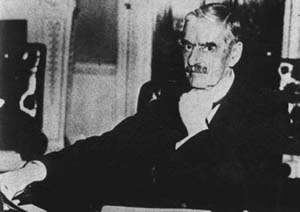Neville Chamberlain
 Neville Chamberlain served as British prime minister (1937-40), and is
remembered for his appeasement policy in the immediate pre-World War II
period. The son of Joseph Chamberlain and half brother of Sir Austen, he
was born and educated in Birmingham in 1869 and after a successful business
career became lord mayor of the city in 1915. Elected to Parliament in
1918, Chamberlain served as postmaster general (1922-23), minister of
health (1923, 1924-29, and 1931), and chancellor of the Exchequer (1923-24
and 1931-37) before he succeeded Stanley Baldwin as prime minister. In that
office his major aim was to avoid a European war at all costs. His policy
of appeasement toward Adolf Hitler's Germany culminated in the Munich Pact
of September 1938, after which Chamberlain returned home proclaiming
"peace in our time".
He soon recognized the failure of his policy and vowed
support for Poland. After Germany's invasion of the country, Chamberlain
led Great Britain into the war against the aggressor. After the British
debacle in the first few months of the war, Chamberlain was forced to
resign in May 1940 and was succeeded by Sir Winston Churchill. He served in
Churchill's cabinet as lord president of the council until October 1940,
when illness forced his resignation. He died the following month.
Neville Chamberlain served as British prime minister (1937-40), and is
remembered for his appeasement policy in the immediate pre-World War II
period. The son of Joseph Chamberlain and half brother of Sir Austen, he
was born and educated in Birmingham in 1869 and after a successful business
career became lord mayor of the city in 1915. Elected to Parliament in
1918, Chamberlain served as postmaster general (1922-23), minister of
health (1923, 1924-29, and 1931), and chancellor of the Exchequer (1923-24
and 1931-37) before he succeeded Stanley Baldwin as prime minister. In that
office his major aim was to avoid a European war at all costs. His policy
of appeasement toward Adolf Hitler's Germany culminated in the Munich Pact
of September 1938, after which Chamberlain returned home proclaiming
"peace in our time".
He soon recognized the failure of his policy and vowed
support for Poland. After Germany's invasion of the country, Chamberlain
led Great Britain into the war against the aggressor. After the British
debacle in the first few months of the war, Chamberlain was forced to
resign in May 1940 and was succeeded by Sir Winston Churchill. He served in
Churchill's cabinet as lord president of the council until October 1940,
when illness forced his resignation. He died the following month.
|

